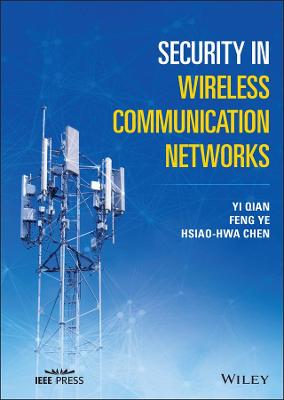Security in Wireless Communication Networks
 -15%
portes grátis
-15%
portes grátis
Security in Wireless Communication Networks
Chen, Hsiao-Hwa; Qian, Yi; Ye, Feng
John Wiley & Sons Inc
12/2021
384
Dura
Inglês
9781119244363
15 a 20 dias
802
Descrição não disponível.
Preface xvii
Acknowledgments xxiii
About the Companion Website xxv
Part I Introduction and Mathematics Background 1
1 Introduction 3
1.1 General Computer Communication Network Architecture 3
1.2 Different Types of Wireless Communication Systems 5
1.3 Network Security and Wireless Security 9
1.4 Summary 11
2 Basic Network Security Concepts 13
2.1 Security Attacks 13
2.2 Security Services 16
2.3 Security Mechanisms 21
2.4 Other Security Concepts 24
2.5 Summary 25
3 Mathematical Background 27
3.1 Basic Concepts in Modern Algebra and Number Theory 27
3.2 Prime Numbers, Modular Arithmetic, and Divisors 30
3.3 Finite Field and Galois Field 34
3.4 Polynomial Arithmetic 35
3.5 Fermat's Little Theorem, Euler's Totient Function, and Euler's Theorem 41
3.6 Primality Testing 44
3.7 Chinese Remainder Theorem 46
3.8 Discrete Logarithm 48
3.9 Summary 49
Part II Cryptographic Systems 51
4 Cryptographic Techniques 53
4.1 Symmetric Encryption 53
4.2 Classical Cryptographic Schemes 53
4.3 Stream Cipher 62
4.4 Modern Block Ciphers 63
4.5 Data Encryption Standard (DES) 67
4.6 Summary 76
5 More on Cryptographic Techniques 77
5.1 Advanced Encryption Standard 77
5.2 Block Cipher Modes of Operation 85
5.3 Public Key Infrastructure 92
5.4 The RSA Algorithm 95
5.5 Diffie-Hellman (D-H) Key Exchange 97
5.6 Summary 99
6 Message Authentication, Digital Signature, and Key Management 101
6.1 Message Authentication 101
6.2 MAC and Hash Algorithms 105
6.3 Digital Signature and Authentication 114
6.4 Key Management 122
6.5 Summary 128
Part III Security for Wireless Local Area Networks 129
7 WLAN Security 131
7.1 Introduction to WLAN 131
7.2 Evolution of WLAN Security 133
7.3 Wired Equivalent Privacy 135
7.4 IEEE 802.1X Authentication Model 140
7.5 IEEE 802.11i Standard 143
7.6 Wi-Fi Protected Access 3 and Opportunistic Wireless Encryption 150
7.7 Summary 152
8 Bluetooth Security 153
8.1 Introduction to Bluetooth 153
8.2 Link Key Generation 157
8.3 Authentication, Confidentiality, and Trust and Service Levels 163
8.4 Cryptographic Functions for Security Modes 1, 2, and 3 166
8.5 Cryptographic Functions in Security Mode 4 (SSP) 173
8.6 Summary 174
9 Zigbee Security 177
9.1 Introduction to Zigbee 177
9.2 IEEE 802.15.4 Security Features 179
9.3 Zigbee Upper Layer Security 182
9.4 Security-Related MAC PIB Attributes 187
9.5 Mechanisms Used in Zigbee Security 188
9.6 Summary 191
10 RFID Security 193
10.1 Introduction to RFID 193
10.2 Security Attacks, Risks, and Objectives of RFID Systems 195
10.3 Mitigation Strategies and Countermeasures for RFID Security Risks 196
10.4 RFID Security Mechanisms 199
10.5 Summary 205
Part IV Security for Wireless Wide Area Networks 207
11 GSM Security 209
11.1 GSM System Architecture 209
11.2 GSM Network Access Security Features 212
11.3 GSM Security Algorithms 215
11.4 Attacks Against GSM Security 225
11.5 Possible GSM Security Improvements 227
11.6 Summary 228
12 UMTS Security 229
12.1 UMTS System Architecture 229
12.2 UMTS Security Features 231
12.3 UMTS Network Access Security 232
12.4 Algorithms in Access Security 240
12.5 Other UMTS Security Features 249
12.6 Summary 250
13 LTE Security 251
13.1 LTE System Architecture 251
13.2 LTE Security Architecture 253
13.3 LTE Security 255
13.4 Handover Between eNBs 261
13.5 Security Algorithms 268
13.6 Security for Interworking Between LTE and Legacy Systems 273
13.7 Summary 278
Part V Security for Next Generation Wireless Networks 279
14 Security in 5G Wireless Networks 281
14.1 Introduction to 5G Wireless Network Systems 281
14.2 5G Security Requirements and Major Drives 283
14.3 A 5G Wireless Security Architecture 287
14.4 5G Wireless Security Services 289
14.5 5G Key Management 300
14.6 Security for New Communication Techniques in 5G 303
14.7 Challenges and Future Directions for 5G Wireless Security 308
14.8 Summary 310
15 Security in V2X Communications 311
15.1 Introduction to V2X Communications 311
15.2 Security Requirements and Possible Attacks in V2X Communications 314
15.3 IEEE WAVE Security Services for Applications and Management Messages 316
15.4 Security in Cellular Based V2X Communications 320
15.5 Cryptography and Privacy Preservation in V2X Communications 323
15.6 Challenges and Future Research Directions 329
15.7 Summary 331
References 333
Index 345
Acknowledgments xxiii
About the Companion Website xxv
Part I Introduction and Mathematics Background 1
1 Introduction 3
1.1 General Computer Communication Network Architecture 3
1.2 Different Types of Wireless Communication Systems 5
1.3 Network Security and Wireless Security 9
1.4 Summary 11
2 Basic Network Security Concepts 13
2.1 Security Attacks 13
2.2 Security Services 16
2.3 Security Mechanisms 21
2.4 Other Security Concepts 24
2.5 Summary 25
3 Mathematical Background 27
3.1 Basic Concepts in Modern Algebra and Number Theory 27
3.2 Prime Numbers, Modular Arithmetic, and Divisors 30
3.3 Finite Field and Galois Field 34
3.4 Polynomial Arithmetic 35
3.5 Fermat's Little Theorem, Euler's Totient Function, and Euler's Theorem 41
3.6 Primality Testing 44
3.7 Chinese Remainder Theorem 46
3.8 Discrete Logarithm 48
3.9 Summary 49
Part II Cryptographic Systems 51
4 Cryptographic Techniques 53
4.1 Symmetric Encryption 53
4.2 Classical Cryptographic Schemes 53
4.3 Stream Cipher 62
4.4 Modern Block Ciphers 63
4.5 Data Encryption Standard (DES) 67
4.6 Summary 76
5 More on Cryptographic Techniques 77
5.1 Advanced Encryption Standard 77
5.2 Block Cipher Modes of Operation 85
5.3 Public Key Infrastructure 92
5.4 The RSA Algorithm 95
5.5 Diffie-Hellman (D-H) Key Exchange 97
5.6 Summary 99
6 Message Authentication, Digital Signature, and Key Management 101
6.1 Message Authentication 101
6.2 MAC and Hash Algorithms 105
6.3 Digital Signature and Authentication 114
6.4 Key Management 122
6.5 Summary 128
Part III Security for Wireless Local Area Networks 129
7 WLAN Security 131
7.1 Introduction to WLAN 131
7.2 Evolution of WLAN Security 133
7.3 Wired Equivalent Privacy 135
7.4 IEEE 802.1X Authentication Model 140
7.5 IEEE 802.11i Standard 143
7.6 Wi-Fi Protected Access 3 and Opportunistic Wireless Encryption 150
7.7 Summary 152
8 Bluetooth Security 153
8.1 Introduction to Bluetooth 153
8.2 Link Key Generation 157
8.3 Authentication, Confidentiality, and Trust and Service Levels 163
8.4 Cryptographic Functions for Security Modes 1, 2, and 3 166
8.5 Cryptographic Functions in Security Mode 4 (SSP) 173
8.6 Summary 174
9 Zigbee Security 177
9.1 Introduction to Zigbee 177
9.2 IEEE 802.15.4 Security Features 179
9.3 Zigbee Upper Layer Security 182
9.4 Security-Related MAC PIB Attributes 187
9.5 Mechanisms Used in Zigbee Security 188
9.6 Summary 191
10 RFID Security 193
10.1 Introduction to RFID 193
10.2 Security Attacks, Risks, and Objectives of RFID Systems 195
10.3 Mitigation Strategies and Countermeasures for RFID Security Risks 196
10.4 RFID Security Mechanisms 199
10.5 Summary 205
Part IV Security for Wireless Wide Area Networks 207
11 GSM Security 209
11.1 GSM System Architecture 209
11.2 GSM Network Access Security Features 212
11.3 GSM Security Algorithms 215
11.4 Attacks Against GSM Security 225
11.5 Possible GSM Security Improvements 227
11.6 Summary 228
12 UMTS Security 229
12.1 UMTS System Architecture 229
12.2 UMTS Security Features 231
12.3 UMTS Network Access Security 232
12.4 Algorithms in Access Security 240
12.5 Other UMTS Security Features 249
12.6 Summary 250
13 LTE Security 251
13.1 LTE System Architecture 251
13.2 LTE Security Architecture 253
13.3 LTE Security 255
13.4 Handover Between eNBs 261
13.5 Security Algorithms 268
13.6 Security for Interworking Between LTE and Legacy Systems 273
13.7 Summary 278
Part V Security for Next Generation Wireless Networks 279
14 Security in 5G Wireless Networks 281
14.1 Introduction to 5G Wireless Network Systems 281
14.2 5G Security Requirements and Major Drives 283
14.3 A 5G Wireless Security Architecture 287
14.4 5G Wireless Security Services 289
14.5 5G Key Management 300
14.6 Security for New Communication Techniques in 5G 303
14.7 Challenges and Future Directions for 5G Wireless Security 308
14.8 Summary 310
15 Security in V2X Communications 311
15.1 Introduction to V2X Communications 311
15.2 Security Requirements and Possible Attacks in V2X Communications 314
15.3 IEEE WAVE Security Services for Applications and Management Messages 316
15.4 Security in Cellular Based V2X Communications 320
15.5 Cryptography and Privacy Preservation in V2X Communications 323
15.6 Challenges and Future Research Directions 329
15.7 Summary 331
References 333
Index 345
Este título pertence ao(s) assunto(s) indicados(s). Para ver outros títulos clique no assunto desejado.
Wireless security; Wi-Fi security; Bluetooth security; local area network security; wide area network security; wireless security cryptography; wireless security cryptographic techniques; 2g security; 3g security; 4g security; 5g security; VANET security
Preface xvii
Acknowledgments xxiii
About the Companion Website xxv
Part I Introduction and Mathematics Background 1
1 Introduction 3
1.1 General Computer Communication Network Architecture 3
1.2 Different Types of Wireless Communication Systems 5
1.3 Network Security and Wireless Security 9
1.4 Summary 11
2 Basic Network Security Concepts 13
2.1 Security Attacks 13
2.2 Security Services 16
2.3 Security Mechanisms 21
2.4 Other Security Concepts 24
2.5 Summary 25
3 Mathematical Background 27
3.1 Basic Concepts in Modern Algebra and Number Theory 27
3.2 Prime Numbers, Modular Arithmetic, and Divisors 30
3.3 Finite Field and Galois Field 34
3.4 Polynomial Arithmetic 35
3.5 Fermat's Little Theorem, Euler's Totient Function, and Euler's Theorem 41
3.6 Primality Testing 44
3.7 Chinese Remainder Theorem 46
3.8 Discrete Logarithm 48
3.9 Summary 49
Part II Cryptographic Systems 51
4 Cryptographic Techniques 53
4.1 Symmetric Encryption 53
4.2 Classical Cryptographic Schemes 53
4.3 Stream Cipher 62
4.4 Modern Block Ciphers 63
4.5 Data Encryption Standard (DES) 67
4.6 Summary 76
5 More on Cryptographic Techniques 77
5.1 Advanced Encryption Standard 77
5.2 Block Cipher Modes of Operation 85
5.3 Public Key Infrastructure 92
5.4 The RSA Algorithm 95
5.5 Diffie-Hellman (D-H) Key Exchange 97
5.6 Summary 99
6 Message Authentication, Digital Signature, and Key Management 101
6.1 Message Authentication 101
6.2 MAC and Hash Algorithms 105
6.3 Digital Signature and Authentication 114
6.4 Key Management 122
6.5 Summary 128
Part III Security for Wireless Local Area Networks 129
7 WLAN Security 131
7.1 Introduction to WLAN 131
7.2 Evolution of WLAN Security 133
7.3 Wired Equivalent Privacy 135
7.4 IEEE 802.1X Authentication Model 140
7.5 IEEE 802.11i Standard 143
7.6 Wi-Fi Protected Access 3 and Opportunistic Wireless Encryption 150
7.7 Summary 152
8 Bluetooth Security 153
8.1 Introduction to Bluetooth 153
8.2 Link Key Generation 157
8.3 Authentication, Confidentiality, and Trust and Service Levels 163
8.4 Cryptographic Functions for Security Modes 1, 2, and 3 166
8.5 Cryptographic Functions in Security Mode 4 (SSP) 173
8.6 Summary 174
9 Zigbee Security 177
9.1 Introduction to Zigbee 177
9.2 IEEE 802.15.4 Security Features 179
9.3 Zigbee Upper Layer Security 182
9.4 Security-Related MAC PIB Attributes 187
9.5 Mechanisms Used in Zigbee Security 188
9.6 Summary 191
10 RFID Security 193
10.1 Introduction to RFID 193
10.2 Security Attacks, Risks, and Objectives of RFID Systems 195
10.3 Mitigation Strategies and Countermeasures for RFID Security Risks 196
10.4 RFID Security Mechanisms 199
10.5 Summary 205
Part IV Security for Wireless Wide Area Networks 207
11 GSM Security 209
11.1 GSM System Architecture 209
11.2 GSM Network Access Security Features 212
11.3 GSM Security Algorithms 215
11.4 Attacks Against GSM Security 225
11.5 Possible GSM Security Improvements 227
11.6 Summary 228
12 UMTS Security 229
12.1 UMTS System Architecture 229
12.2 UMTS Security Features 231
12.3 UMTS Network Access Security 232
12.4 Algorithms in Access Security 240
12.5 Other UMTS Security Features 249
12.6 Summary 250
13 LTE Security 251
13.1 LTE System Architecture 251
13.2 LTE Security Architecture 253
13.3 LTE Security 255
13.4 Handover Between eNBs 261
13.5 Security Algorithms 268
13.6 Security for Interworking Between LTE and Legacy Systems 273
13.7 Summary 278
Part V Security for Next Generation Wireless Networks 279
14 Security in 5G Wireless Networks 281
14.1 Introduction to 5G Wireless Network Systems 281
14.2 5G Security Requirements and Major Drives 283
14.3 A 5G Wireless Security Architecture 287
14.4 5G Wireless Security Services 289
14.5 5G Key Management 300
14.6 Security for New Communication Techniques in 5G 303
14.7 Challenges and Future Directions for 5G Wireless Security 308
14.8 Summary 310
15 Security in V2X Communications 311
15.1 Introduction to V2X Communications 311
15.2 Security Requirements and Possible Attacks in V2X Communications 314
15.3 IEEE WAVE Security Services for Applications and Management Messages 316
15.4 Security in Cellular Based V2X Communications 320
15.5 Cryptography and Privacy Preservation in V2X Communications 323
15.6 Challenges and Future Research Directions 329
15.7 Summary 331
References 333
Index 345
Acknowledgments xxiii
About the Companion Website xxv
Part I Introduction and Mathematics Background 1
1 Introduction 3
1.1 General Computer Communication Network Architecture 3
1.2 Different Types of Wireless Communication Systems 5
1.3 Network Security and Wireless Security 9
1.4 Summary 11
2 Basic Network Security Concepts 13
2.1 Security Attacks 13
2.2 Security Services 16
2.3 Security Mechanisms 21
2.4 Other Security Concepts 24
2.5 Summary 25
3 Mathematical Background 27
3.1 Basic Concepts in Modern Algebra and Number Theory 27
3.2 Prime Numbers, Modular Arithmetic, and Divisors 30
3.3 Finite Field and Galois Field 34
3.4 Polynomial Arithmetic 35
3.5 Fermat's Little Theorem, Euler's Totient Function, and Euler's Theorem 41
3.6 Primality Testing 44
3.7 Chinese Remainder Theorem 46
3.8 Discrete Logarithm 48
3.9 Summary 49
Part II Cryptographic Systems 51
4 Cryptographic Techniques 53
4.1 Symmetric Encryption 53
4.2 Classical Cryptographic Schemes 53
4.3 Stream Cipher 62
4.4 Modern Block Ciphers 63
4.5 Data Encryption Standard (DES) 67
4.6 Summary 76
5 More on Cryptographic Techniques 77
5.1 Advanced Encryption Standard 77
5.2 Block Cipher Modes of Operation 85
5.3 Public Key Infrastructure 92
5.4 The RSA Algorithm 95
5.5 Diffie-Hellman (D-H) Key Exchange 97
5.6 Summary 99
6 Message Authentication, Digital Signature, and Key Management 101
6.1 Message Authentication 101
6.2 MAC and Hash Algorithms 105
6.3 Digital Signature and Authentication 114
6.4 Key Management 122
6.5 Summary 128
Part III Security for Wireless Local Area Networks 129
7 WLAN Security 131
7.1 Introduction to WLAN 131
7.2 Evolution of WLAN Security 133
7.3 Wired Equivalent Privacy 135
7.4 IEEE 802.1X Authentication Model 140
7.5 IEEE 802.11i Standard 143
7.6 Wi-Fi Protected Access 3 and Opportunistic Wireless Encryption 150
7.7 Summary 152
8 Bluetooth Security 153
8.1 Introduction to Bluetooth 153
8.2 Link Key Generation 157
8.3 Authentication, Confidentiality, and Trust and Service Levels 163
8.4 Cryptographic Functions for Security Modes 1, 2, and 3 166
8.5 Cryptographic Functions in Security Mode 4 (SSP) 173
8.6 Summary 174
9 Zigbee Security 177
9.1 Introduction to Zigbee 177
9.2 IEEE 802.15.4 Security Features 179
9.3 Zigbee Upper Layer Security 182
9.4 Security-Related MAC PIB Attributes 187
9.5 Mechanisms Used in Zigbee Security 188
9.6 Summary 191
10 RFID Security 193
10.1 Introduction to RFID 193
10.2 Security Attacks, Risks, and Objectives of RFID Systems 195
10.3 Mitigation Strategies and Countermeasures for RFID Security Risks 196
10.4 RFID Security Mechanisms 199
10.5 Summary 205
Part IV Security for Wireless Wide Area Networks 207
11 GSM Security 209
11.1 GSM System Architecture 209
11.2 GSM Network Access Security Features 212
11.3 GSM Security Algorithms 215
11.4 Attacks Against GSM Security 225
11.5 Possible GSM Security Improvements 227
11.6 Summary 228
12 UMTS Security 229
12.1 UMTS System Architecture 229
12.2 UMTS Security Features 231
12.3 UMTS Network Access Security 232
12.4 Algorithms in Access Security 240
12.5 Other UMTS Security Features 249
12.6 Summary 250
13 LTE Security 251
13.1 LTE System Architecture 251
13.2 LTE Security Architecture 253
13.3 LTE Security 255
13.4 Handover Between eNBs 261
13.5 Security Algorithms 268
13.6 Security for Interworking Between LTE and Legacy Systems 273
13.7 Summary 278
Part V Security for Next Generation Wireless Networks 279
14 Security in 5G Wireless Networks 281
14.1 Introduction to 5G Wireless Network Systems 281
14.2 5G Security Requirements and Major Drives 283
14.3 A 5G Wireless Security Architecture 287
14.4 5G Wireless Security Services 289
14.5 5G Key Management 300
14.6 Security for New Communication Techniques in 5G 303
14.7 Challenges and Future Directions for 5G Wireless Security 308
14.8 Summary 310
15 Security in V2X Communications 311
15.1 Introduction to V2X Communications 311
15.2 Security Requirements and Possible Attacks in V2X Communications 314
15.3 IEEE WAVE Security Services for Applications and Management Messages 316
15.4 Security in Cellular Based V2X Communications 320
15.5 Cryptography and Privacy Preservation in V2X Communications 323
15.6 Challenges and Future Research Directions 329
15.7 Summary 331
References 333
Index 345
Este título pertence ao(s) assunto(s) indicados(s). Para ver outros títulos clique no assunto desejado.







